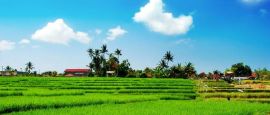Laos: Doing business & staying in touch
Doing business in Laos
Business meetings in Laos tend to be formal but friendly. Handshakes are a common greeting, though a slight bow or nod is also appreciated. Punctuality is valued, and meetings often begin with small talk before moving to formal matters. Dress conservatively, and avoid showing impatience, as Lao culture prizes calm and respect. Business cards are exchanged with both hands, and hierarchy should be acknowledged by addressing senior participants first.
Laos has undergone a gradual economic transformation since the 1990s, shifting from a largely subsistence-based agricultural system to a more diversified, market-oriented economy. Agriculture still employs most of the population, particularly rice cultivation along the fertile floodplains of the Mekong River. Coffee, grown on the Bolaven Plateau, remains the country's most valuable export crop, known for its rich flavour and high quality. Livestock, timber and small-scale handicrafts also contribute to rural livelihoods.
Natural resources play a key role in the country's development. Laos has abundant hydropower potential, and electricity generation — much of it exported to Thailand and Vietnam — has become a cornerstone of the national economy. Mining of copper, gold and other minerals provides additional income, although environmental and social concerns have prompted tighter regulation. The government continues to invest in large-scale infrastructure projects, including the Laos–China Railway, to improve trade links and attract foreign investment.
Tourism is another growing pillar of the Lao economy. The country's peaceful atmosphere, Buddhist heritage and spectacular landscapes draw increasing numbers of visitors each year. Luang Prabang's UNESCO World Heritage status, the expanding adventure tourism scene around Vang Vieng, and community-based ecotourism in rural provinces all help sustain local economies. Despite its modest tourism numbers compared to neighbours, Laos' reputation for authenticity and low-impact travel makes it an attractive choice for travellers seeking a slower pace.
Challenges remain, particularly in diversifying the economy and reducing reliance on resource exports. Infrastructure in remote areas is limited, and access to education and healthcare continues to affect productivity. Nonetheless, steady economic growth and cross-border cooperation with China, Thailand and Vietnam are gradually integrating Laos into regional trade networks. As modernisation progresses, the government aims to balance development with environmental conservation — a principle that aligns with the Lao philosophy of harmony between people and nature.
Keeping in Touch in Laos
Mobile coverage in Laos is generally good in cities and larger towns but can be patchy in remote or mountainous areas. The main network providers are Lao Telecom, Unitel and ETL, all of which offer prepaid SIM cards with data, local calls and international packages at affordable rates. SIM cards can be purchased easily at airports, convenience stores and official retail outlets — a passport is required for registration. International roaming works with most networks, though costs can be high, so buying a local SIM is often the better option.
Wi-Fi is widely available in hotels, cafés and restaurants in Vientiane, Luang Prabang and other tourist centres. 4G mobile data is reliable in urban areas, though speeds can drop in rural regions or during heavy rainfall. While the government monitors online content, travellers rarely experience restrictions on general browsing or communication apps. Those heading to remote areas should download maps and travel information in advance, as connections can be intermittent outside cities.
Laos has a state-regulated media environment, with most newspapers, television and radio stations operated by the government. English-language publications such as the Vientiane Times provide local news, while Lao National Television and Lao National Radio are the main broadcast outlets. International news channels like BBC, CNN and Al Jazeera are available via satellite in many hotels. Social media use is widespread, though visitors are advised to avoid posting or sharing material that could be seen as critical of the government, religion or culture.








 You know where
You know where